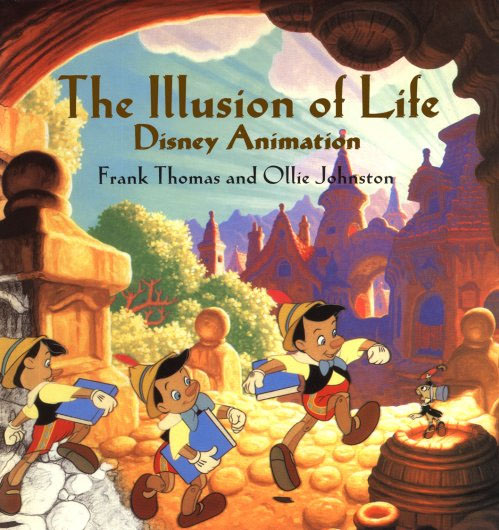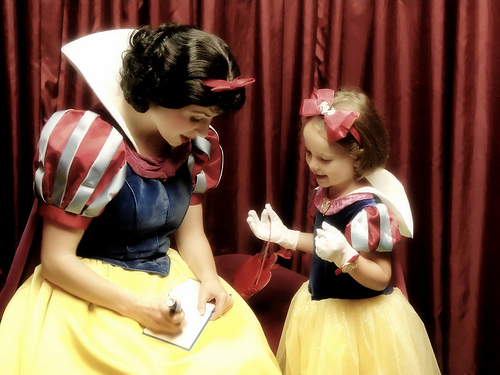“There is a good bet that I will erase all of this from my laptop, and you will never read it. But if you are reading it, and you’re reading it right now, it is only because I was unable to stop.” Those aren’t my words; they’re from the mission statement in Jerry Maguire—you’ll need the special edition to read it—but I can relate. Cameron Crowe wasn’t the guy who got me interested in filmmaking, but his movies have been a big reason why I’ve kept at it in spite of the heartaches that have come along the way.
It’s hard enough to write about someone whose abilities I greatly admire, but it’s a whole other ballgame when his work has impacted my life in a deep, sometimes searing way.
Photo credit: flickr.com/michelleu-c
break
I figured I could either do a polished, impersonal pass at it, or I could tell the truth. It’s an obvious choice if I want to honor the things Cameron Crowe values: the power of telling the truth even when it hurts is a recurring theme in his work.
Some examples to prove my case: “Let us be honest,” are the first words we see Jerry Maguire write in the mission statement I mentioned at the beginning. Writing it changes his life.
In Vanilla Sky, Tom Cruise’s character gets a chance at true love only when he can honestly confront the ugly parts of himself. William, the Cameron Crowe alter ego in Almost Famous, has to choose between looking cool and being honest. Like almost every other Cameron Crowe hero, William chooses honesty and takes a beating for it, but he emerges stronger by the end.
Photo credit: flickr.com/yewenyi
break
Don’t forget, the first movie Crowe directed was titled Say Anything. The name comes from an understanding between a father and a daughter that they can say anything to each other as long as it is honest. When the dad gets caught lying, it destroys their relationship.
OK, so we’ll be honest, but let’s get some context before we dive too deep. “Rhythm,” “dissonance,” and “rebellion” are words you might expect to find in a rock & roll discussion. But optimism? The word seems a little out of place. That is, it seems out of place until you throw Cameron Crowe into the mix.
Photo credit: flickr.com/bluepisces
break
An accomplished filmmaker, Crowe has earned rock & roll cred by writing for Rolling Stone, where he got to interview and tour with some of the biggest rock bands of the 70s. Plus, he’s penned liner notes for bands like Led Zeppelin and Lynyrd Skynyrd, worked on music videos, and is currently finishing up a documentary on Pearl Jam.
Then, of course, there are his movies. Singles and Almost Famous are both grounded in specific music scenes, Seattle grunge for Singles and 1970s rock in Almost Famous. Along with Nancy Wilson, he created a fictional band for Almost Famous and then recorded a few of their songs. His other films have compelling soundtracks that he’s helped to arrange. He plays music on set to get his actors in the right mood and talks about his movies in musical terms.
With just a line or two of dialogue like the quote that follows, he gives us insightful music commentary but makes it feel like it’s the most casual observation in the world: “So this is what’s become of rock and roll, a smashed guitar behind a glass case displayed in some rich guy’s wall.” Oh yeah, and he was married to Nancy Wilson, the guitarist from Heart.
Photo credit: flickr.com/edberman
break
So where does optimism fit in? To hear Crowe tell it, it’s as if optimism and rock & roll were made for each other. In this interview with beliefnet.com, Crowe states, “I think if you have an open mind and you aren’t too strict about where the greatest messages in life can come from, and honor the message itself, you’ve got to say rock & roll is a powerful, powerful messenger for goodness-as well as subversive elements that are there in all elements of the world. But I love great music and the transcendent place that it takes you to.”
It was Cameron Crowe who described himself as a “warrior for optimism” in an interview with Entertainment Weekly, and he’s earned the title with his body of work. His movies remind us of why we’ve grown cynical but then conquer that cynicism with sincerity and decency.
Before she meets her true love, played by Campbell Scott, Krya Sedgwick’s character in Singles gets conned by someone who only wants her body. That makes her a little more guarded. Steve has his own setbacks to overcome. He has committed all of his efforts at work to building a monorail. In most movies he would succeed at his goal and win the girl in the process. In this one, his project fails entirely. Still, the couple makes it work by sharing their frustrations with each other.
Pearl Jam, “The Fixer” directed by Cameron Crowe
break
If you haven’t seen Singles yet, give it a shot. There are lots of fun cameo appearances. Some of the guys from Pearl Jam are in it, playing in a band called Citizen Dick. They’re as cheesy as you’d expect with a name like that. Then there’s Tim Burton who we learn is going to be the “next Martin Scor-ceese.” He makes ridiculously awful dating videos for his clients.
And let’s not forget our friend Paul Giamatti of Lady in the Water fame. He plays “Kissing Man,” but he does so much with his few moments on screen. There is passion but vulnerability. Ferocious intensity, but also a longing desire to get past the superficial aspect of it all. It’s like he’s channeling James Cagney and Earnest Borgnine at the same time. OK, I’m just kidding … about the James Cagney bit. Still it was a good moment for the Giamaiester, and I’m guessing the casting director for Sideways liked his work in Singles enough to give him the keys to kingdom. Anyway…
In Almost Famous, the band does sell out. They listen to Jimmy Fallon’s promoter and opt to go the route that will get them more money and publicity. In the process they leave young William high and dry, and they do away with their beloved band bus, nicknamed Doris, to get a jet. Symbolic of their decision to sell out, the jet literally almost kills them. Eventually, the band members confront their flaws, and Russell Hammond does right by William. Only when the band rediscovers its soul does Doris the bus return.
Photo credit: flickr.com/jerryjohn
break
Jerry Maguire is inspired to write his mission statement because he notices that “in the quest for the big dollars a lot of the little things were going wrong.” People at his agency were willing to do anything to make more money, even if that meant lying or putting the health of their players at risk.
Everyone remembers the phrase “show me the money” from that film, but Jerry’s mission statement actually emphasizes putting personal relationships above profit. He wants to be in the business of caring about his clients, of doing the right thing. That’s why he gets fired.
Oh yes, I remember when I first saw Jerry Maguire. I was in London, studying abroad. It was a new city for me to explore, full of history, of drama, of possibility. We were sort of a family, me and all the American kids in my program, but slowly the all-too-familiar feeling of being out of place returned.
How awful to feel that way even in a seemingly magical metropolis. I had to numb myself. It was the only way I knew to deal with the pain. Doing that sort of thing only hurts when the numbness wears off, but when it does, it is so very hard to get up and fight again.
I didn’t want to get up and fight again. Things did not change for me, no matter what I did or where I went. I was about to go to sleep, but something told me to turn on the TV. I did and saw that Jerry Maguire was playing. I thought, “no way do I want to watch an egotistical jerk shout about getting more money.” Still, the voice insisted. Curious, I started to watch. Soon the movie got to the part where Tom Cruise’s character realizes that he’s good at business but horrible at intimacy. That got my attention. It did more than that, in fact.
Photo credit: flickr.com/thomashawk
break
On one level, Jerry Maguire is about a man who carves out a new and noble sports business for himself, but on a deeper level it is about a man who learns to love by remembering the notable example of his now-absent father. As he tells us in voice over, Jerry becomes his father’s son again when he writes the mission statement. Then, he bonds with Dorothy’s boy because they both miss their fathers, and the boy wants Jerry Maguire to be his new dad. That brings Jerry closer to Dorothy, which forces him to break through his fears of intimacy and finally arrive at love.
Seeing Jerry Maguire find love made me a little more hopeful that I could someday make things work. My reaction was like that of the kid in Say Anything who hears about how Lloyd Dobler, a financially challenged jock, is daring to make things work with a more affluent girl who happens to be the school’s valedictorian: “This is great. This gives me hope. Thanks.”
Photo credit: flickr.com/thomashawk
break
It was Jerry Maguire and the hug of one girl in London that made it possible for me to write my first script. The girl was the first one who ever hugged me in a way that felt like it meant, “I am so very glad that you are here.” I didn’t know hugs could do that.
Back to our director’s films. It’s not just in Jerry Maguire that Cameron Crowe makes dramatic use of an absent father. There’s no father in Almost Famous, a dead one in Elizabethtown, an incarcerated one in Say Anything, an abandoning one in Singles, and a distant, corporate one in Vanilla Sky.
The absence of a caring father is so devastating to Tom Cruise’s character in Vanilla Sky that he imagines a surrogate father into his life. Add to that what Tom Cruise the person has shared about his own abusive father, and Vanilla Sky becomes, more than any other film that comes to mind, a sort of cautionary tale about how the absence of a noble father can sour the development of a young man. (There is also a bit of that in the TV show Lost, but you’re in a different category when you have lots more hours to tell your story.)
Photo credit: flickr.com/alan-light, 1989
break
Vanilla Sky is actually a retelling of the Spanish film Abre los ojos (Open Your Eyes). Both are excellent films, but Vanilla Sky has an added layer that examines celebrity culture. It comes with the territory of having Tom Cruise in your movie, and his performance consists partly of playing up to our expectations of him as a celebrity. That’s why it has more of an impact when he also plays against those expectations in the film.
Taking into account Almost Famous, Jerry Maguire, and Vanilla Sky, I don’t think it’s a stretch to conclude that Cameron Crowe has a bit of a love-hate relationship with celebrities. On the one hand, the famous ones are often capable of awe-inspiring greatness, but on the other hand they can be thoughtless in how they treat others. They’re also sometimes enabled to damage the world by those who protect them from the consequences of their actions.
In Almost Famous, the band trades Penny Lane to another band for a case of beer. When Penny finds out she tries to kill herself. At first, even Jerry Maguire protects the sports stars he represents from sexual allegations until he gets a change of heart. Tom Cruise’s character in Vanilla Sky is oblivious to how his actions are hurting others, until it is too late.
Photo credit: flickr.com/brandoncwarren
break
Still, one of the big ideas in Vanilla Sky, as Crowe himself tells us, is the value of being able to take the sweet and the sour that life has to offer. That’s also not a bad way to think about celebrities.
Sure, a band might abuse drugs and women, but that doesn’t negate the joy they spread when performing. Celebrities like Joan Crawford or Tom Cruise might have their dark sides, but that doesn’t detract from their dedication to their craft or their capacities for emotional honesty. It is possible and quite healthy to admire others without overlooking their flaws.
That kind of approach has been enormously helpful to me. It allows me to confront bad behavior even when it comes from people I admire, and for almost everyone there is the sour that goes with the sweet, even for Cameron Crowe.
Photo credit: flickr.com/margolove
break
He is one of my favorite filmmakers, but I still wince at some of his tendencies. He does fight for optimism, but his movies also encourage a more casual attitude toward swearing. It’s not that swear words offend me or that I don’t ever swear myself, but there is something to be said for civil discourse in public. It bothers me a little more when it’s the young kids in the scene who say the swear words, as happens in Say Anything and Jerry Maguire.
And then there is Fast Times at Ridgemont High. That’s the one he wrote but didn’t direct. Prior to listening to that commentary track, I thought his commentaries always added depth and texture to his films. I mean, how can you not admire a guy who includes the perspectives of his mom and his wife in his discussions?
Well, the Fast Times commentary is the only one I’ve ever heard that has made me like a film less. In it, Crowe explains how he was so excited to hear Sean Penn say “dick” that he would plead for him to say it every time he saw him. When I heard that, I imagined Cameron Crowe as the kind of kid who would punch the piñata he carried in celebration every time someone described a girl’s breasts. Classy.
Photo credit: flickr.com/brandoncwarren
break
Also, he and Amy Heckerling bemoan the mean ol’ ratings board that would not allow them to show erect penises along with the two naked chicks that they already featured, one of them almost showing full-frontal nudity. Crowe laughs off concerns from the critics that they were exploiting teenage girls for their film. The characters might have been underage he tells us, but the actresses were at least 18, and the girls wanted to go even further with the sex scenes. If anything, the filmmakers were showing tasteful restraint, Crowe suggests. What a jerk, I thought.
I enjoy seeing beautiful women as much as the next guy, but it is such a challenge not to get caught up in treating women like sex objects, and movies like that don’t help. Sex is such a big part of our lives, but it can be devastating when we get it wrong, so why make things tougher on the audience by showing them such explicit images?
Photo credit: flickr.com/seeminglee
break
On top of that, one of the girls in the movie spends more time deliberating about what dress to wear than about whether she should get an abortion. In this movie, picking the right dress requires consultation, but getting an abortion doesn’t. It’s just a matter of finding the right person to drive you to the clinic.
I know that abortion is a tough subject, and I don’t expect every filmmaker to share my point of view, but how disappointing to see that getting an abortion was played as such an obvious choice.
I was actually depressed for a few hours after watching the movie and hearing the commentary. Why was I admiring the guy largely responsible for such a shallow film? Clearly he was just like everyone else, and I was so wrong about him, and if Cameron Crowe is like that then why not settle for a shallow existence? Then I got a nice text message from a friend, and that sent away my sour thoughts.
To be fair, the book version of Fast Times at Ridgemont High, which I read shortly after re-watching the movie, was more enjoyable. That’s the one Cameron Crowe wrote before he turned it into a screenplay, and it has more nuanced character moments in it. For example, Spicoli the pothead isn’t just there for comic relief. He’s trying to cope with his dysfunctional family and his struggles in school. As to the abortion scene, we actually read about the girl’s feelings of dread and isolation at the clinic. She asks the doctor, “Does it hurt more to have a baby?” He responds, “Yes. But you mind it less.” That does change the context a bit, don’t you think?
Photo credit: flickr.com/brandoncwarren
break
It’s encouraging that Crowe’s depictions of sex have matured in his later films. There’s nudity in Vanilla Sky, but it is handled in a more tasteful way. In his comments about that film, he talks about the merits of not having sex right away and about how casual sex is never as casual as people pretend. Then there’s the line from Cameron Diaz: “When you sleep with someone, your body makes a promise whether you do or not.” In Elizabethtown, Kirsten Dunst’s modesty is protected by a few foaming bubbles, and so the scene becomes flirty but not lascivious.
A few days went past before I realized why Fast Times affected me the way that it did. I had been idolizing Cameron Crowe, and doing that can lead to trouble. No man is God, regardless of how talented or famous. Cameron Crowe is a big inspiration, but he’s human just like the rest of us. He has his virtues and his vices. I just wasn’t willing to acknowledge that before I started preparing for this post.
That’s why I defended Elizabethtown as a great movie when it first came out. It isn’t. It’s a well-intentioned film with terrific music and moments of greatness, but it has its flaws.
Instead of allowing the ensuing action to develop from the inciting incident, Crowe tries to expand the story by resorting to attention-grabbing set pieces like an over-the-top wedding party unrelated to the main characters, a TV show about exploding houses, and Susan Surandon doing a comedy routine about boners. Her routine actually causes a plane-like bird to crash and start a fire. Subtle realism that scene is not.
He didn’t have to resort to those kinds of tricks on movies like Jerry Maguire or Vanilla Sky. I’m guessing the problem was that certain aspects of his own father’s death were still too painful for him to explore in a creative project. Still, the movie made enough of an impression that it inspired me to take a road trip and to seek out some of the cities that the movie mentioned.
Photo credit: Me, road trip 1: Beale St., Memphis. (Photos from Road Trip 2 are here.)
break
Anyway, my reaction to Fast Times got me thinking about how people might see me if they only saw certain moments of my life in isolation. Some moments might suggest that I’m a monster, others that I’m a saint, but I’d like to think I’m just a guy trying to do the best I can with what I’ve been dealt. I’m still waiting for God to fix the parts in me I can’t resolve. Someday.
I’ve definitely done things I’m not proud of doing. I’ve tried to move on, to do better, but sometimes I still stumble. Meaning well doesn’t change the fact that there are still consequences to the things we do, no matter how much we try to avoid them.
Remember the girl in London I mentioned earlier? Things didn’t work out with her. At that point in my life, I wasn’t ready to meet her. I was too busy trying to numb the pain, and so I lacked the character I needed to really connect with her. Sad when that happens.
Photo credit: flickr.com/c-reel
break
It’s like Jason Lee explains to Tom Cruise in Vanilla Sky, “You can do whatever you want with your life, but one day you’ll know what love truly is, it’s the sour and the sweet.” You can’t have one without the other.
The holidays can be a time of celebration, but they can also be a reminder of all the things in our lives that aren’t working. If you’re hurting, don’t give up. Actions have consequences, but to quote Vanilla Sky once again, “Every passing minute is another chance to turn it all around.” What’s done can’t be undone, but it’s not too late to fix the future.
Photo credit: flickr.com/bea-258
break
In Say Anything Ione Skye begs a banker to “be a little decent,” but why be just a little decent? Be boldly, outrageously decent and take that leap of faith. All kinds of interesting things might happen if you do that, but you’ll never know if you never jump off that building. Good is out there. It’s just a little harder to see in our cynical world.
In a featurette for Jerry Maguire Tom Cruise tells us, “Optimism in many ways is a revolutionary act today. People who are optimistic tend to get battered a little bit in this world at times.” That’s true even for Cameron Crowe. Elizabethtown, the last movie he made, took a beating from the critics, and his divorce to Nancy Wilson just got finalized this month.
Photo credit: flickr.com/bea-258
break
So, this Christmas lets send our prayers of gratitude and hope to Cameron Crowe: May you stand up once again, like the noble warrior that you are, and lead us bravely into battle once more. For what it is worth, I’m still fighting, and you’re a big reason why.
Let’s end with a story. My mom is the kind of person who always seems to walk in on a movie at the most inopportune moments. One year when I was watching Jerry Maguire at home, she came in during the sex scene at the beginning. “Why are you watching this trash?” she asked. I tried to explain that it wasn’t as graphic as it could have been, and that the movie actually had a positive message. She walked away unconvinced.
Later she came back during the climactic football scene at Christmas. She studied the screen for a moment then spoke.
Photo credit: flickr.com/pagedooley
break
She mentioned John 3:16, as if she had just won an argument. I asked her what she meant, and she pointed to the screen. Sure enough, there is a poster prominently positioned in the stadium that says “John 3:16.” I had never noticed that before. At least the movie got one things right, her words and gestures conveyed. Yeah. Rock and Roll, Cameron Crowe.
Merry Christmas everyone, and God bless.
break
To learn more about Cameron Crowe or to read some of the articles he wrote for Rolling Stone, check out his site at cameroncrowe.com.
If you appreciate my writing, why not write a comment to say thanks or share the post with a friend? It would encourage me to keep writing and sharing bits of my heart with you. But, I don’t want to keep spending time on things that people don’t value, so would you please speak up if you want me to keep writing?
If you’ve enjoyed reading this post or some of the others I’ve written, consider signing up to get my posts by email. You can do that by clicking here. I don’t write every week. If I did, I wouldn’t have the time to write the kinds of posts I prefer to write.
I only write if I believe I have something worth writing and after I’ve spent some time finessing my thoughts. If you’re following along by email, you’ll know right away when I have a new post waiting for you. It is very easy to unsubscribe, and you won’t receive anything unrelated to my blog. As always, thank you for reading.






















